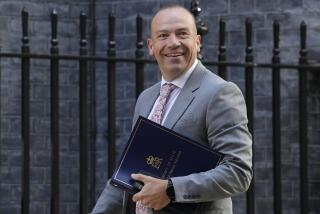British House of Commons OKs Europe Unity Treaty : Community: The vote provides the second boost this week to the union pact. The meaure now goes to the House of Lords.
- Share via
LONDON — After months of acrimonious debate and hurtful political infighting, the House of Commons voted Thursday night to ratify the Maastricht Treaty on European unity.
The bill now goes to the House of Lords, where its approval is expected despite fierce opposition from Tory peers led by former Prime Minister Margaret Thatcher.
Conservative Party leaders viewed the victory on behalf of European unity in the House--two days after it was approved in a referendum in Denmark--as completing approval of the Maastricht Treaty by the 12 members of the European Community.
The vote was 292 in favor and 112 opposed to the pact, which calls for greater political and economic union inside the EC. Britain’s opposition Labor Party, generally in favor of the treaty with some reservations about its social welfare provisions, abstained from the vote.
The opposition came from so-called Euro-rebels on both sides in Commons, including many Tories who had threatened to split the party over their objections to Maastricht.
And while some aspects of the bill may be legally challenged, Conservative Parliament managers believe that the ratification process will have cleared both houses before the Parliament recesses in August.
In ending 204 hours of debate, a process that stretched over a period of months, Foreign Secretary Douglas Hurd warned a packed House on Thursday: “There would be lasting damage to British interests if, with ratification completed or in sight in 11 member states, we were now to destroy the treaty.”
Chancellor of the Exchequer Norman Lamont called for an end to bitter infighting within the Conservative Party, declaring: “We have all in this debate got to recognize that there have been strong feelings on both sides, and people have had perfectly legitimate feelings and every reason to put their views--and recriminations have to be put aside.”
The treaty, which was signed by Prime Minister John Major in December, 1991, and easily passed a preliminary vote by the House of Commons soon after, became the subject of intense party squabbles after the Danes initially rejected it in a referendum a year ago.
The fight has left scars, particularly among the Conservatives, but aides to Major say that the government can now put this squabble behind it and turn to the economy and other pressing items that were put aside during the long debate over Maastricht.
More to Read
Sign up for Essential California
The most important California stories and recommendations in your inbox every morning.
You may occasionally receive promotional content from the Los Angeles Times.













